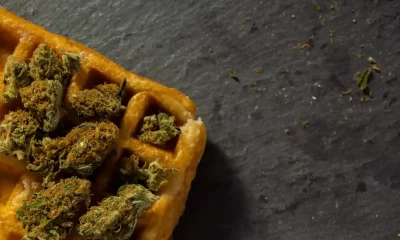Business
Cannabis Plantation Burned by Indonesian Authorities After Discovered by Drones

Indonesian law enforcement on Wednesday torched thousands of illegally grown cannabis plants that were spotted from above.
The Associated Press reports that authorities in Indonesia burned a marijuana plantation “after it was discovered by drones.”
“A joint team of the National Narcotic Agency, known as BNN, and the National Research and Innovation Agency using drones detected 4.5 hectares (11 acres) of land with an estimated 21,100 cannabis plants ready for harvest, said Wayan Sugiri, the deputy for eradication at BNN. The aerial operation was conducted from Aug. 3 to 13 in Teupin Reuseup village in North Aceh district,” according to the Associated Press.
Indonesia, the largest Muslim-majority country in the world, has extremely strict laws prohibiting marijuana. According to Leafwell, the country “carries some of the strictest laws and drug penalties worldwide.”
“In rare cases, the penalty for marijuana in Indonesia can be death,” Leafwell says. “These usually occur with drug smuggling in quantities over 1 kilogram (kg) or more than five plants, but home-growers could easily risk a potential arrest and charge.”
Despite that, there is a long history of cannabis use in Indonesia, particularly in the aforementioned province of Aceh. According to the South China Morning Post, “marijuana is deeply embedded in Acehnese culture and authorities turn a blind eye to its consumption.” The AP says that cannabis is the most widely used illegal drug in Indonesia.
Authorities have not, however, turned a blind eye to its cultivation in Aceh.
“This is a form of the government’s firmness against illegal drugs and their circulation,” Sugiri said of Wednesday’s burning, as quoted by the Associated Press.
According to the AP, it was the government’s fifth burning of the year, with authorities burning “43 hectares (106 acres) [and] an estimated 190,000 marijuana plants” in March alone.
Wednesday’s burning involved “more than 150 officers from the police, customs and [National Narcotic Agency],” which said that the officers were “deployed to uproot the 20 tons of marijuana for burning.”
There has been a concerted effort to legalize medical cannabis, which is also prohibited in Indonesia. Last year, lawmakers there heard testimony from various advocates.
But so far, reform has proven elusive. The AP said that last year “Indonesia’s Constitutional Court rejected a judicial review of the country’s narcotics law that would have paved the way for legalizing marijuana for medicinal use.”
The United Nations has identified Indonesia as a major smuggling route, saying that the country’s “border weaknesses exacerbate the country’s vulnerability to trafficking of persons, drugs and natural resources, as well as smuggling of migrants.”
“Indonesia was formally a transit country for drugs, with much of its supply coming from Europe and other parts of Asia. During the last five years, the domestic manufacture of amphetamine-type stimulants has increased to meet the growing demand for crystalline methamphetamine and ecstasy (MDMA). Locally produced amphetamine-type stimulants is also trafficked internationally, at a rate that prompts concerns that Indonesia will soon rival Europe as a provider for the world’s MDMA consumption,” the UN says.
“The Government has steadily increased the capacity of its institutional actors and agencies, including the training of special units to combat transnational organized crime and trafficking, and has successfully prosecuted and convicted individuals for such offences. Despite this progress, serious transnational organized crime and trafficking threats continue to confront Indonesia. Capacity of institutions and officials can be insufficient to deal with the threats of transnational organized crime. Other institutions, such as the judiciary and the Attorney General’s Office have similar capacity and resource constraints.”
Business
New Mexico cannabis operator fined, loses license for alleged BioTrack fraud

New Mexico regulators fined a cannabis operator nearly $300,000 and revoked its license after the company allegedly created fake reports in the state’s traceability software.
The New Mexico Cannabis Control Division (CCD) accused marijuana manufacturer and retailer Golden Roots of 11 violations, according to Albuquerque Business First.
Golden Roots operates the The Cannabis Revolution Dispensary.
The majority of the violations are related to the Albuquerque company’s improper use of BioTrack, which has been New Mexico’s track-and-trace vendor since 2015.
The CCD alleges Golden Roots reported marijuana production only two months after it had received its vertically integrated license, according to Albuquerque Business First.
Because cannabis takes longer than two months to be cultivated, the CCD was suspicious of the report.
After inspecting the company’s premises, the CCD alleged Golden Roots reported cultivation, transportation and sales in BioTrack but wasn’t able to provide officers who inspected the site evidence that the operator was cultivating cannabis.
In April, the CCD revoked Golden Roots’ license and issued a $10,000 fine, according to the news outlet.
The company requested a hearing, which the regulator scheduled for Sept. 1.
At the hearing, the CCD testified that the company’s dried-cannabis weights in BioTrack were suspicious because they didn’t seem to accurately reflect how much weight marijuana loses as it dries.
Company employees also poorly accounted for why they were making adjustments in the system of up to 24 pounds of cannabis, making comments such as “bad” or “mistake” in the software, Albuquerque Business First reported.
Golden Roots was fined $298,972.05 – the amount regulators allege the company made selling products that weren’t properly accounted for in BioTrack.
The CCD has been cracking down on cannabis operators accused of selling products procured from out-of-state or not grown legally:
- Regulators alleged in August that Albuquerque dispensary Sawmill Sweet Leaf sold out-of-state products and didn’t have a license for extraction.
- Paradise Exotics Distro lost its license in July after regulators alleged the company sold products made in California.
Golden Roots was the first alleged rulebreaker in New Mexico to be asked to pay a large fine.
Source: https://mjbizdaily.com/new-mexico-cannabis-operator-fined-loses-license-for-alleged-biotrack-fraud/
Business
Marijuana companies suing US attorney general in federal prohibition challenge

Four marijuana companies, including a multistate operator, have filed a lawsuit against U.S. Attorney General Merrick Garland in which they allege the federal MJ prohibition under the Controlled Substances Act is no longer constitutional.
According to the complaint, filed Thursday in U.S. District Court in Massachusetts, retailer Canna Provisions, Treevit delivery service CEO Gyasi Sellers, cultivator Wiseacre Farm and MSO Verano Holdings Corp. are all harmed by “the federal government’s unconstitutional ban on cultivating, manufacturing, distributing, or possessing intrastate marijuana.”
Verano is headquartered in Chicago but has operations in Massachusetts; the other three operators are based in Massachusetts.
The lawsuit seeks a ruling that the “Controlled Substances Act is unconstitutional as applied to the intrastate cultivation, manufacture, possession, and distribution of marijuana pursuant to state law.”
The companies want the case to go before the U.S. Supreme Court.
They hired prominent law firm Boies Schiller Flexner to represent them.
The New York-based firm’s principal is David Boies, whose former clients include Microsoft, former presidential candidate Al Gore and Elizabeth Holmes’ disgraced startup Theranos.
Similar challenges to the federal Controlled Substances Act (CSA) have failed.
One such challenge led to a landmark Supreme Court decision in 2005.
In Gonzalez vs. Raich, the highest court in the United States ruled in a 6-3 decision that the commerce clause of the U.S. Constitution gave Congress the power to outlaw marijuana federally, even though state laws allow the cultivation and sale of cannabis.
In the 18 years since that ruling, 23 states and the District of Columbia have legalized adult-use marijuana and the federal government has allowed a multibillion-dollar cannabis industry to thrive.
Since both Congress and the U.S. Department of Justice, currently headed by Garland, have declined to intervene in state-licensed marijuana markets, the key facts that led to the Supreme Court’s 2005 ruling “no longer apply,” Boies said in a statement Thursday.
“The Supreme Court has since made clear that the federal government lacks the authority to regulate purely intrastate commerce,” Boies said.
“Moreover, the facts on which those precedents are based are no longer true.”
Verano President Darren Weiss said in a statement the company is “prepared to bring this case all the way to the Supreme Court in order to align federal law with how Congress has acted for years.”
While the Biden administration’s push to reschedule marijuana would help solve marijuana operators’ federal tax woes, neither rescheduling nor modest Congressional reforms such as the SAFER Banking Act “solve the fundamental issue,” Weiss added.
“The application of the CSA to lawful state-run cannabis business is an unconstitutional overreach on state sovereignty that has led to decades of harm, failed businesses, lost jobs, and unsafe working conditions.”
Business
Alabama to make another attempt Dec. 1 to award medical cannabis licenses

Alabama regulators are targeting Dec. 1 to award the first batch of medical cannabis business licenses after the agency’s first two attempts were scrapped because of scoring errors and litigation.
The first licenses will be awarded to individual cultivators, delivery providers, processors, dispensaries and state testing labs, according to the Alabama Medical Cannabis Commission (AMCC).
Then, on Dec. 12, the AMCC will award licenses for vertically integrated operations, a designation set primarily for multistate operators.
Licenses are expected to be handed out 28 days after they have been awarded, so MMJ production could begin in early January, according to the Alabama Daily News.
That means MMJ products could be available for patients around early March, an AMCC spokesperson told the media outlet.
Regulators initially awarded 21 business licenses in June, only to void them after applicants alleged inconsistencies with how the applications were scored.
Then, in August, the state awarded 24 different licenses – 19 went to June recipients – only to reverse themselves again and scratch those licenses after spurned applicants filed lawsuits.
A state judge dismissed a lawsuit filed by Chicago-based MSO Verano Holdings Corp., but another lawsuit is pending.
Source: https://mjbizdaily.com/alabama-plans-to-award-medical-cannabis-licenses-dec-1/
-

 Business2 years ago
Business2 years agoPot Odor Does Not Justify Probable Cause for Vehicle Searches, Minnesota Court Affirms
-

 Business2 years ago
Business2 years agoNew Mexico cannabis operator fined, loses license for alleged BioTrack fraud
-

 Business2 years ago
Business2 years agoAlabama to make another attempt Dec. 1 to award medical cannabis licenses
-

 Business2 years ago
Business2 years agoWashington State Pays Out $9.4 Million in Refunds Relating to Drug Convictions
-

 Business2 years ago
Business2 years agoMarijuana companies suing US attorney general in federal prohibition challenge
-

 Business2 years ago
Business2 years agoLegal Marijuana Handed A Nothing Burger From NY State
-

 Business2 years ago
Business2 years agoCan Cannabis Help Seasonal Depression
-

 Blogs2 years ago
Blogs2 years agoCannabis Art Is Flourishing On Etsy













